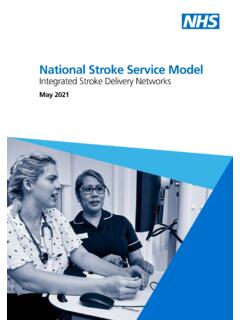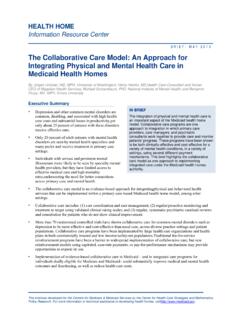Transcription of Success Profiles - Civil Service Behaviours
1 Success Profiles Civil Service Behaviours Success profile Framework What are Success Profiles ? The Success profile Framework The elements that can be assessed to find the best candidate for the role are: is being introduced to attract and retain people of talent and Behaviours - the actions and activities experience from a range of sectors that people do which result in effective performance in a job. and all walks of life, in line with the commitment in the Civil Service Strengths - the things we do regularly, do well and that motivate us. Workforce Plan. Ability - the aptitude or potential to perform The Success profile Framework moves to the required standard.
2 Recruitment away from using a purely Experience - the knowledge or mastery competency based system of assessment. It of an activity or subject gained through introduces a more flexible framework which involvement in or exposure to it. assesses candidates against a range of elements using a variety of selection methods. Technical - the demonstration of This will give the best possible chance of specific professional skills, knowledge or finding the right person for the job, driving qualifications. up performance and improving diversity and inclusivity. Not all elements are relevant to every role, so the makeup of the Success profile should be different for different types of job to improve the chances of getting the best person for the role.
3 Civil Service Behaviours Behaviours are the actions and activities that people do which result in effective performance in a job. The Civil Service has defined a set of Behaviours that, when demonstrated, are associated with job Success . Civil Service Behaviours are specific to the grade level of the job role. It is important to remember that recruiting managers will choose a selection of Behaviours which are best suited to the specific job role. You will not be asked to demonstrate all Civil Service Behaviours for one role. The examples of the Behaviours are designed to give an overview of what is expected of individuals at each level.
4 There is no expectation that all individuals will need to demonstrate every part of each example to be successful. Civil Service Behaviours | i Why we assess Behaviours When looking at Behaviours , we As Behaviours can be observed and measured, they can help us to predict what your want to get an understanding of the performance in the role could be. actions and activities that you have done (or would do) that result in If a recruiting manager wishes to assess Behaviours they will review the Civil Service effective performance in a job. Behaviours to determine which are most relevant to the job role. Read the job description carefully to see which Behaviours are required for the job you are applying for.
5 How we assess Behaviours Behaviours can be assessed in This might be at work or somewhere else such as work experience, volunteering or in a number of ways and at various connection with a hobby. stages of the recruitment process, including: Alternatively, you may be asked how you would behave in a given situation, for example by Application form using Situational Judgement Tests or through CV situational interview questions. You could also be asked to demonstrate a behaviour Civil Service Judgement Test in real-time, for example during a structured Interview behavioural assessment. Presentation Your Behaviours may be assessed alongside In-tray exercise other elements of the Success profile to get Written analysis/exercise a more rounded picture of your suitability for the role.
6 The job description will outline the Personality test elements required for the role and the selection Job related simulation method(s) that will be used. Group exercise/discussion The Civil Service is a diverse and inclusive Role-play workplace and we want to help you Oral briefing demonstrate your full potential whatever type of assessment is used. If you require any Assessment centre. reasonable adjustments to our recruitment process please let the recruiting manager know. Depending on the type of assessment, for Examples of adjustments include providing example in an application form or at an documents in large print or braille, allowing interview, you may be asked to give examples more time for a test or interview or providing of when you have demonstrated a particular assistance at an assessment centre.
7 Behaviour. Civil Service Behaviours | ii Definitions of Behaviours Seeing the Big Picture Understand how your role fits with and supports organisational objectives. Recognise the wider Civil Service priorities and ensure work is in the national interest. Changing and Improving Seek out opportunities to create effective change and suggest innovative ideas for improvement. Review ways of working, including seeking and providing feedback. Making effective Decisions Use evidence and knowledge to support accurate, expert decisions and advice. Carefully consider alternative options, implications and risks of decisions. Leadership Show pride and passion for public Service .
8 Create and engage others in delivering a shared vision. Value difference, diversity and inclusion, ensuring fairness and opportunity for all. Communicating and Influencing Communicate purpose and direction with clarity, integrity and enthusiasm. Respect the needs, responses and opinions of others. Working Together Form effective partnerships and relationships with people both internally and externally, from a range of diverse backgrounds, sharing information, resources and support. Developing Self and Others Focus on continuous learning and development for self, others and the organisation as a whole. Managing a Quality Service Deliver Service objectives with professional excellence, expertise and efficiency, taking account of diverse customer needs.
9 Delivering at Pace Take responsibility for delivering timely and quality results with focus and drive. Civil Service Behaviours | iii Contents Level 1 AA and AO or equivalent 1. Level 2 EO or equivalent 3. Level 3 HEO and SEO or equivalent 5. Level 4 Grade 7 and 6 or equivalent 8. Level 5 Deputy Director or equivalent 11. Level 6 Director and Director General 14. Civil Service Behaviours | iv Level 1 - AA and AO or equivalent Examples of Behaviours at this level are: Seeing the Big Picture Understand what your responsibilities are and how these contribute to the priorities of your team. Consider the varied impact your work could have on individuals with different needs and from other backgrounds.
10 Gather information from both inside and outside of the organisation to inform your area of work. Changing and Improving Review ways of working and suggest improvements, including how to make full use of new digital technologies. Learn new procedures and help colleagues to do the same. Query any issues that arise from changes in a suitable way. Respond in an effective and appropriate manner when emergencies arise. Making effective Decisions Use guidance, analyse relevant information and ask colleagues for input to support decision making. Identify and deal with any errors or gaps in information before making a decision.

















